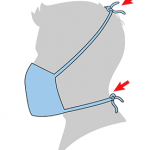Make the most of your grocery shopping trip (and budget)
 In these strange times, many of us are seeing our grocery budgets skyrocket, and often resort to pre-made frozen dinners or fast food to save both money and time when it comes to cooking. However, it is important to prioritize a healthy diet, even and especially when you are staying home to protect yourself from coronavirus.
In these strange times, many of us are seeing our grocery budgets skyrocket, and often resort to pre-made frozen dinners or fast food to save both money and time when it comes to cooking. However, it is important to prioritize a healthy diet, even and especially when you are staying home to protect yourself from coronavirus.
So, how can you create healthy meals without breaking the bank? Below are some tips on trimming your grocery budget while buying nutritious ingredients for healthy meals.
Planning
In order to shop effectively, planning what you want to eat is imperative. Think of a few meals that include some of the same ingredients. For example, tomatoes and onions can be used in salads, sandwiches, and dinner meals like homemade spaghetti sauce and curry. What kind of meals do you and your family enjoy, even as leftovers?
When you have decided on some meals for the week or two ahead, check your fridge and pantry for what you already have in order to avoid double-buying. Then, make a list of what you still need to buy. Look for opportunities to make healthy swaps, like substituting rice for healthier quinoa. Also, try to include seasonal produce, as it will be cheaper at the grocery store. With both your meal plan and your grocery list, you are ready to go to the store.
Shopping
Before grocery shopping, make sure you have a snack or a meal at home. Shopping while hungry leads to unnecessary and often unhealthy purchases in the store. Also, be sure to wear a face mask while out in public.
While at the store, follow these guidelines to help you stay on task and on budget:
- Stick to your list. Avoid aisles that do not contain items from your list to avoid the temptation of buying unnecessary snacks.
- When it comes to fresh produce, avoid buying in bulk. Even if it seems like a better value, you will likely end up not being able to finish it before it goes bad and needs to be thrown out. If you do by in bulk, blanch and freeze your leftover veggies for later use.
- Do not be brand loyal. Always compare the price labels of off-brand items to avoid over-spending.
- Before checking out, compare the items in your cart to the items on your list. Sometimes when walking through the aisles, a bag of chips or a pack of sodas can find their way into your cart or an important staple left out. Checking your cart and list before getting in line helps you evaluate exactly what you are buying.
Cooking
Follow the meal schedule you planned before shopping. It will reduce the stress of deciding what to make every day when you are hungry, busy, or tired. Also, because you built a plan and shopped accordingly, you will always have exactly what you need and can avoid food waste.
Try preparing enough food for several meals and freeze your leftovers. Place enough food for 1-2 meals in each container and label them in your freezer. That way, when you do not have the time or energy to prepare food from scratch, you can easily find and heat up your pre-made food for a delicious, nutritious meal.





